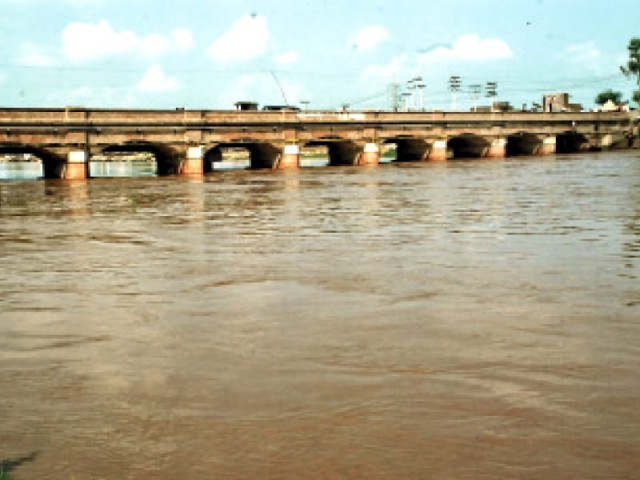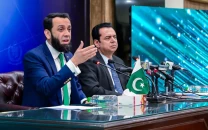Govt plans to build Chenab dam amid IWT row
IMF opposes 1% water storage cess on goods

The International Monetary Fund has rejected Pakistan's proposal to impose 1% water storage cess on goods to build mega dams and instead suggested to increase the 18% standard sales tax rate for funding any enlarged size of the federal development programme.
The development came amid an anticipated revision in the cost of the Diamer-Basha dam and needing funds to build a new Chenab dam over the Chenab river, which will require at least additional Rs800 billion, according to the government sources.
Official sources said that the global lender did not endorse the proposal to impose water storage cess, which the government wanted to introduce on every taxable product produced in the country, except electrical energy and medicines. The cess has been proposed to fund two mega water storage dams and build a new one as a solution to deal with Indian water aggression.
The development pushes the government in a tight spot, which was willing to increase the tax burden but only in a fashion that would ensure that 100% of the collection stays in the federal kitty instead of being shared with provinces.
In case of cess, the government will have the full right on the collection while sales tax would become part of the federal divisible pool.
The government had sought the IMF's permission to impose the new tax after majority of the provincial governments showed reluctance to finance the early completion of the Diamer-Bhasha dam and the Mohmand Dam. The government had proposed that the provinces should pick half of the Rs716 billion cost of the Benazir Income Support Programme and the Rs358 billion fiscal space will be used to build dams at a faster pace to deal with Indian aggression. The provinces refused.
The spokesman of Ministry of Finance Qumar Abbasi did not comment on the development.
The sources said that the IMF has many objections to the water storage cess proposal, including the legal and governance challenges. They added the Fund was of the view that any special levy reduces the flexibility in the budget and the sales tax can give such flexibility.
Moreover, the IMF was not comfortable with the idea of giving the control of the new cess to the Water and Power Development Authority (Wapda), they added.
The IMF had earlier asked the government to fund these dams from the Rs1 trillion worth Public Sector Development Programme (PSDP). But the government was not inclined to get more money from the PSDP, which this year was focusing more on the needs of the coalition partners than having mega strategic projects as national priority.
The sources said that the IMF informed Pakistan that if it wanted to get more money for development spending then it can consider increasing the rate of sales tax.
The standard sales tax rate is 18% while the government also charges 3% extra sales tax rate in case a good is sold to an unregistered person.
The government's earlier decision to increase the petroleum levy rate to give electricity subsidy and fund a road in Balochistan has led to abnormal increase in prices of diesel and petrol since July 1st.
The landed cost of diesel is Rs177.89 per liter and petrol's Rs168.73 per liter, excluding all types of margins, rupee depreciation impact and taxes. However, after adding these additional costs, the high-speed diesel price is set at Rs284.35 and petrol at Rs272.15 per liter.
Seven years ago, the government had approved the Diamer-Bhasha dam at a cost Rs479 billion and Mohmand at Rs310 billion. The sources said that the revised estimates suggest that the Diamer Basha dam cost may skyrocket to over Rs1.1 trillion, an addition of around Rs620 billion. The exact cost will be determined when the Planning Ministry receives the revised documents.
Even against the original Rs479 billion cost, the government needed Rs365 billion more to complete the work. For this fiscal year, only Rs25 billion has been allocated for the Diamer Basha dam, which is even less than last fiscal year.
Likewise, the Mohmand dam was approved at a cost of Rs310 billion seven years ago and it still requires a minimum of Rs173 billion more at the old price. Only Rs35.7 billion has been allocated for the new fiscal year.
Likewise, the government is planning to build a dam on the Chenab river with a cost of about Rs220 billion. This requires an additional Rs800 billion for Chenab dam and Diamer-Basha dam. After adding up the remaining financing requirements, the government needs a total Rs1.35 trillion for just these three dams.
India has threatened to cut water supplies after it held the Indus Waters Treaty (IWT) in abeyance in violation of the treaty provisions and in the breach of the international law. Islamabad has plainly told India that any such act would be considered as an act of war.
For this fiscal year, the government has reduced the water sector development budget by 28% to Rs133 billion. Now it wants to offset this by introducing a new tax.
One of the options is that instead of levying a new 1% cess or increasing GST rate, the government should amend the GIDC law and divert the already collected much over Rs400 billion money towards building dams.
The Ministry of Water Resources has informed the government that it would take 15 years to complete the Mohmand dam and over 20 years to finish work on the Diamer-Bhasha dam at the current pace of the budget allocations.
Ahsan Iqbal, the federal minister for Planning and Development has already ruled out creating any further space in the PSDP to fund the large projects.
The government has held meetings this week in the Planning Ministry and the Prime Minister's Office to finalize a strategy for funding other projects, which can be completed and to be inaugurated by Prime Minister Shehbaz Sharif this year.




















COMMENTS
Comments are moderated and generally will be posted if they are on-topic and not abusive.
For more information, please see our Comments FAQ